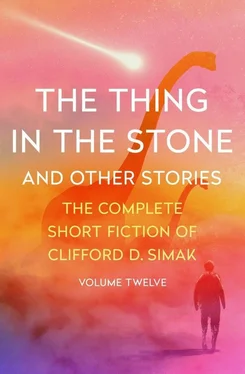More than likely the painting here in this burrow was in itself a clue. More than likely it was a painting of that unknown place Clay had visited before coming here to die. But if that were so, thought Lathrop, it was a slender hope, for one might spend three lifetimes—or more—combing planet after planet in the vain hope recognizing the scene Clay had spread upon the canvas.
He watched the gnome busy at the stove, and there was no sound except the lonely whining of the wind in the chimney and at the tunnel’s mouth. Lonely wind and empty moor and the little villages of heaped earth, here at the far edge of the galaxy, out in the rim of the mighty wheel of suns. How much do we know of it, he thought, this thing we call our galaxy, this blob of matter hurled out into the gulf of space by some mighty Fist? We do not know the beginning of it nor the end of it nor the reason for its being; we are blind creatures groping in the darkness for realities and the few realities we find we know as a blind man knows the things within his room, knowing them by the sense of touch alone. For in the larger sense we all are as blind as he—all of us together, all the creatures living in the galaxy. And presumptuous and precocious despite our stumbling blindness, for before we know the galaxy we must know ourselves.
We do not understand ourselves, have no idea of the purpose of us. We have tried devices to explain ourselves, materialistic devices and spiritualistic devices and the application of pure logic, which was far from pure. And we have fooled ourselves, thought Lathrop. That is mostly what we’ve done. We have laughed at things we do not understand, substituting laughter for knowledge, using laughter as a shield against our ignorance, as a drug to still our sense of panic. Once we sought comfort in mysticism, fighting tooth and nail against the explanation of the mysticism, for only so long as it remained mysticism and unexplained could it comfort us. We once subscribed to faith and fought to keep the faith from becoming fact, because in our twisted thinking faith was stronger than the fact.
And are we any better now, he wondered, for having banished faith and mysticism, sending the old faiths and the old religions scurrying into hiding places against the snickers of a galaxy that believes in logic and pins its hope on nothing less than fact. A step, he thought—it is but a step, this advancement to the logic and the fact, this fetish for explaining. Some day, far distant, we may find another fact that will allow us to keep the logic and the fact, but will supply once again the comfort that we lost with faith.
The gnome had started cooking and it had a good smell to it. Almost an Earth smell. Maybe, after all, the eating would not be as bad as he had feared.
“You like Clay?” the gnome asked.
“Liked him. Sure, I liked him.”
“No. No. You do like he? You make the streaks like he?”
Lathrop shook his head. “I do nothing now. I am (how did you say retired?) … My work is ended. Now I play (play, because there was no other word).”
“Play?”
“I work no more. I do now as I please. I learn of Clay’s life and I (no word for write) … I tell his life in streaks. Not those kind of streaks. Not the kind of streaks he made. A different kind of streaks.”
When he had sat down he’d put his knapsack beside him. Now he drew it to his lap and opened it. He took out the pad of paper and a pencil. “This kind of steaks,” he said.
The gnome crossed the room to stand beside him.
Lathrop wrote on his pad: I was a whitherer. I used facts and logic to learn whither are we going. I was a seeker after truth.
“Those kind of streaks,” he said. “I have made many streaks of Clay’s life.”
“Magic,” said the gnome.
It was all down, thought Lathrop, all that he had learned of Clay. All but the missing years. All down in page after page of notes, waiting for the writing. Notes telling the strange story of a strange man who had wandered star to star, painting planet after planet, leaving his paintings strewn across the galaxy. A man who had wandered as if he might be seeking something other than new scenes to put upon his canvases. As if his canvases were no more than a passing whim, no more than a quaint and convenient device to earn the little money that he needed for food and polting plots, the money that enabled him to go on to system after system. Making no effort to retain any of his work, selling every bit of it or even, at times, simply walking off and leaving it behind.
Not that his paintings weren’t good. They were—startlingly good. They were given honored places in many galleries, or what passed as galleries, on many different planets.
Clay had stayed for long at no place. He had always hurried on. As if there were a purpose or a plot which drove him from star to star.
And the sum total of the wandering, of the driven purpose, had ended here in this very burrow, no more than a hiding place against the wind and weather.
“Why?” asked the gnome. “Why make the streaks of Clay?”
“Why?” said Lathrop. “Why? I do not know!”
But the answer, not only of Clay’s wandering, but of his following in Clay’s tracks, might be within his grasp. Finally, after all the years of searching, he might find the answer here.
“Why do you streak?”
And how to answer that?
How had Clay answered? For they must have asked him, too. Not how, because you do not ask the how of magic. But why … that was permissible. Not the secret of the magic, but the purpose of it.
“So we may know,” said Lathrop, groping for the words, “So all of us may know, you and I and all the others on other stars may know what kind of being (man?) Clay was.”
“He was … (kind?). He was one of us. We loved him. That is all we need to know.”
“All you may need,” said Lathrop. “But not enough for others.”
Although there probably would not be many who would read the monograph once he had written it. Only a pitiful few would take the time to read it, or even care to read it.
He thought: Now, finally, I know what I’ve known all along, but refused to admit I knew; that I’m not doing this for others, but for myself alone. And not for the sake of occupation, not for the sake of keeping busy in retirement, but for some deeper reason and for some greater need. For some factor or some sense, perhaps, that I missed before. For some need I do not even recognize. For some purpose that might astound me if I ever understood it.
The gnome went back to the stove and got on with the meal and Lathrop continued to sit with his back against the wall, realizing now the tiredness that was in him. He’d had a busy day. Polting was not difficult, actually seemed easy, but it took a lot out of a man. And, in addition to that, he’d walked twenty miles from his landing place to reach the village.
Polting might be easy, but it had not been easy to come by, for its development had been forced to wait upon the suspension of erroneous belief, had come only with the end of certain superstitions and the false screen of prejudice set up to shield Man against his lack of knowledge. For if a man did not understand a thing, he called it a silly superstition and let it go at that. The human race could disregard a silly superstition and be quite easy in its mind, but it could not disregard a stubborn fact without a sense of guilt.
Shuffling footsteps came down the tunnel and four gnomes emerged into the burrow. They carried crude gardening tools and these they set against the wall, then stood silently in a row to stare at the man sitting on the floor.
The old gnome said: “It is another one like Clay. He will stay with us.”
They moved forward, the four of them, and stood in a semi-circle facing Lathrop. One of them asked the old gnome at the stove: “Will he stay here and die?” And another one said, “He is not close to dying, this one.” There was anticipation in them.
Читать дальше












